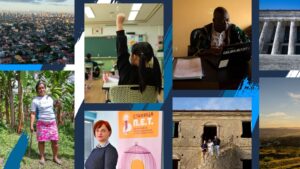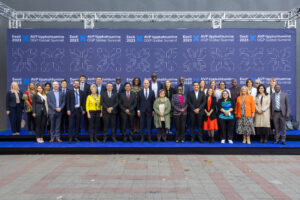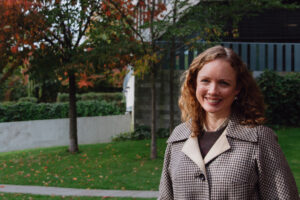Faces of Open Government: Torunn Reksten
Meet Torunn Reksten, a plain language expert at the Language Council of Norway and Vice President of the Plain Language Association International. She has played a pivotal role in championing plain language as a powerful tool for enhancing government communication, transparencyAccording to OGP’s Articles of Governance, transparency occurs when “government-held information (including on activities and decisions) is open, comprehensive, timely, freely available to the pub... More, and accessibility in Norway.
As we commemorate International Plain Language Day, Torunn takes us into the intersection of plain language and open government and explains how clear and accessible communication can lead to more inclusive, transparent, and user-friendly public services.
Can you explain how using plain language in government communications contributes to greater transparency and accessibility of public information and services?
We should always remember this one thing: What we write impacts real people!
Communication and language are structural elements of integrity, transparency, and accessibility, therefore plain language is a means to achieve OGP’s goals. Plain language is a powerful tool for democracy and inclusionOGP participating governments are working to create governments that truly serve all people. Commitments in this area may address persons with disabilities, women and girls, lesbian, gay, bisexual, tr... More as it helps people make informed, confident decisions about their health, rights, families, work, and lives. The ability to understand a written text is a driver of people’s autonomy, of people’s dignity, and of a better society.
Citizens have the right to understand the laws that govern them, court proceedings in matters that affect them, and what the government is doing in their name. Plain language eases the communication between government and citizens. Importantly it builds trust in government, which is key to efficient cooperation and a well-functioning society.
Could you share an example of a specific project where plain language significantly improved citizens’ engagement with government information?
There are many examples to choose from but today I will draw your attention to Brazil where plain language has grown immensely in the public sector.
In July 2021, the state Court of JusticeTo address barriers that prevent citizens from having their justice needs met, OGP participating governments are working to expand transparency, accountability, and inclusion into all systems of justi... in Goiás started writing didactic summaries of their sentences using artificial intelligence, plain language, and legal design techniques. Once the sentences were made public, lawyers and clients received the summary via WhatsApp. This led to a significant drop in the rate of appealability (when someone requests the judge’s decision to be reviewed). The rate fell from 3.1 percent to 1.7 percent. This is a 55 percent decrease in requests for sentence revision.
You represent Norway in International Organization for Standardization (ISO) 24995 to standardize plain language. How does standardizing plain language practices internationally help advance open government principles globally?
Yes, the very first ISO standard on plain language came out in June 2023 – an important milestone for plain language! The standard states that for a document to be in plain language, the contents should be relevant, and the reader must be able to find, understand, and use the information.
Standardizing plain language is certainly good for transparency. A standard provides a clear and adopted understanding of what plain language is and how you can achieve it. Perspectives on plain language vary across the world. When good practices, experiences, concerns, and perspectives from all over the world come together, therein lies its true strength. Writing a standard is consensus-based; if something is important enough for enough experts, it will become part of the standard.
The Norwegian Language Act contains a plain language section. Could you elaborate on the key provisions of this act and how it has improved government communications in Norway?
Norway’s Language Act states that “Public bodies shall communicate in plain and correct language adapted to the target group.”
Change is a slow process, and having plain language legislationCreating and passing legislation is one of the most effective ways of ensuring open government reforms have long-lasting effects on government practices. Technical specifications: Act of creating or r... in place certainly doesn’t mean that our work is done. On the contrary! Now the work needs to be implemented, for example, through action plans.
Still, we do see the effects of the legislation. Even though it doesn’t have any sanctions, public institutions can be reviewed for compliance. Both the Office of the Auditor General of Norway and the Parliamentary Ombud for Scrutiny of the Public Administration have already carried out auditsInstitutional and legal frameworks are necessary for providing assurance of the integrity of financial information and of compliance with budgetary rules and procedure. Technical specifications: These....
A surprising but welcome effect is the discourse arising on the power balance between the government and the citizens. Often public agencies produce documents that carry power, such as rules that affect our lives and compromise our freedom, such as curfews or the right to cross borders. Many of these documents are written for readers with high literacy skills and previous knowledge of the subject matter. Strong voices argue that the concept of plain language should also include encouraging and enabling citizens to critically review the message. How far the government’s responsibility stretches is a topic for discussion. Still, I believe that we’re on the right track if people become empowered when they read public information. In such cases, we share the power of the authorities with the citizens. And that’s what we want in a democracy.
How do you see the Open Government PartnershipThe Open Government Partnership (OGP) is a multi-stakeholder initiative focused on improving government transparency, ensuring opportunities for citizen participation in public matters, and strengthen... More (OGP) playing a role in promoting plain language, particularly in ensuring that government communication is clear and accessible to all citizens?
I hope OGP will embrace plain language as a tool to make government communications more accessible. OGP could support and promote the ISO standard, and call on its members to use the OGP platform to commit to making communications more accessible.
In action plans or other relevant documents, OGP could point out:
- areas where plain language is crucial, for example the health sector.
- specific documents that should be in plain language, for example privacy documents people have to approve to be allowed to use many digital services.
- specific groups of citizens who have a special right to plain language.
Drawing on your experiences in Norway as well as internationally, what advice (or best practices) would you give to other countries looking to improve their government communications through the implementation of plain language initiatives?
The Plain Language Association International works to raise public awareness and make government communications more accessible. We know that in different regions, countries – and even in organizations – there are different levels of plain language maturity and acceptance. If plain language isn’t advanced in your country, organization, or field of work, gather success stories from projects abroad or in other fields. This can inspire the leadership and build trust among the staff too.
Other best practices also include developing a good governance strategy, establishing the role of plain language officers, measuring and reporting on results, and providing training and necessary resources. And there is no shortage of resources! In addition, there is a generous culture for sharing, supporting, and learning from each other. When we started our systematic plain language work in Norway 15 years ago, research and practice from individuals and institutions worldwide enabled us to provide updated and usable knowledge, tools, and practices.
We also know that aligning plain language with organizational values increases compliance. By emphasizing the links between clarity of information, plain language guidelines, and the organizational values, you can encourage a shift in mindset that is likely to resonate with people.
I also want to emphasize the power of empathy for accessibility and inclusion. Negative emotions like fear and shame can get in the way of clear thinking and compromise our ability to understand and retain information. In a fair, equitable society everyone needs to be able to use products and services. If we are to write documents or design services that work better for everyone, we need to embrace people’s differences – not just tolerate them. Then we have to turn our understanding into practice.
To illustrate this point I have another example from Brazil, from the company that operates the bus lines in São Paulo. They ran a campaign to raise awareness of sexual abuse. The campaign used slang words instead of technical and legal terms. There was some worry that the public would find these expressions vulgar, yet the company ran it anyway. And it yielded great results: There was a 58 percent increase in reports of sexual assault, and the campaign was considered appropriate by 87.9 percent of passengers.
I hope all OGP members will join the international discussions about plain language on LinkedIn in English, Portuguese, Spanish, and German.
Comments (1)
Leave a Reply
Related Content

Open Gov Guide
The Open Gov Guide is the go-to resource for officials, civil society representatives, and other actors looking for recommendations, examples, and resources on open government.

OGP Steering Committee Tallinn Commitment

Remarks from OGP’s CEO Sanjay Pradhan at the 2023 OGP Global Summit


Johan Tønnesson Reply
Brilliant, Torunn!